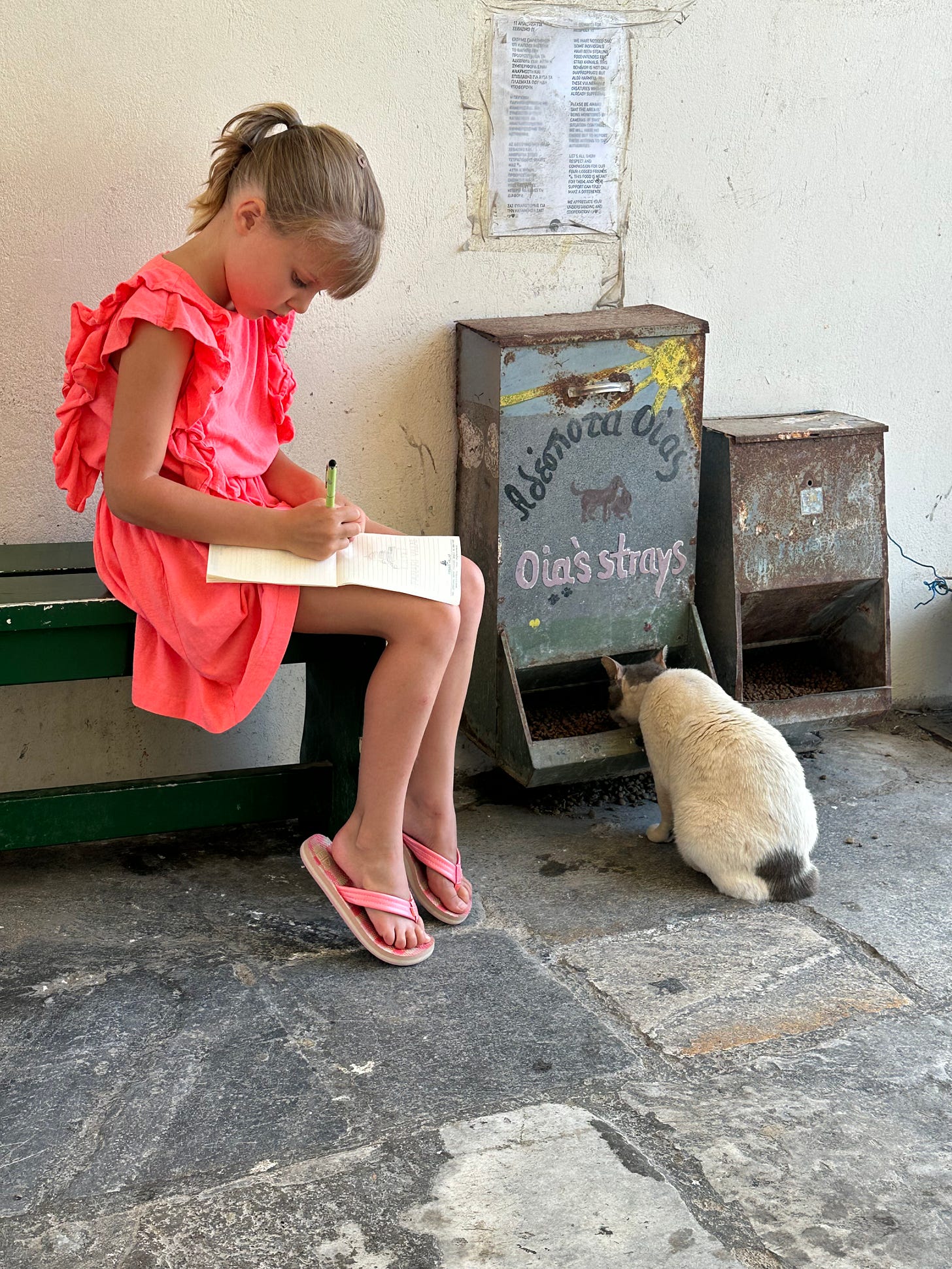Vivian’s short, salt-and-pepper hair was hidden under a white kitchen rag, so that she appeared to us as little more than her round, purple glasses and beaming smile. Without a hint of rushing, she knotted worn white rags on all our heads before we began preparing dinner. With practiced hands, she calmly showed all four of my children how to roll out phyllo dough, how to fillet fish, how to stuff grape leaves with rice.
She was so kind to me I wanted to cry. I wondered if it was an act; every day she took more tourists into her kitchen, teaching them how to prepare the food her Greek grandmother made for her. Was she pretending to like us? For tips? But she was so sincerely proud of my children when they weren’t timid with the sharp knives and when they handled the slimy fish heads without wincing. She hugged us so many times.
As if she couldn’t help herself, Vivian introduced me to her own daughter, whose black curls escaped from beneath the rag on her head. After dinner, the carafe of generic yellow wine nearly empty, she twisted her arm around mine to teach me a Greek dance. To the tune of a scratchy Greek record, we kicked and shuffled around her patio, occasionally leaping to avoid stepping on the cats. After that we were sweaty and tired. “Family is all that matters,” she said to me, making the kind of eye contact I usually avoid.
I took my children to Greece to show them that there are other ways of living. Still, they are talking about the food, which was almost always the same five or ten ingredients, consistent and simple and fresh. It came without branding or packaging, vibrant and confettied with herbs.
The air conditioning, where we could find it, was less reliable. The kids hated that they couldn’t flush their toilet paper. The spaces in which we slept were smaller, all of us in one whitewashed mountainside cave by the end. Everywhere we went, old men tweaked the girls’ ears and ruffled their hair, grinning.
I once read that, to help yourself make decisions, you should picture yourself as a person standing on a stage. This imaginative distancing can help you think more objectively about yourself as a person living in the world. Just re-positioning our consciousness—from inside ourselves to something outside ourselves—can help us see things more clearly.
Going to other countries is a bit like that. You can stand at a distance and see your life for what it is.
Whenever we have exchange students, I become hyper-aware of the amount of disposable packaging that cycles through our house and how often our family gets in and out of cars. I feel self-conscious that all our kids have their own bedrooms and that we have so many televisions. Our packaged sandwich bread seems gross.
Our eleven-year-old, a budding naturalist, said America is “just buildings and streets.” She’s been to four countries so far, and she likes seeing less developed land, more space left to its own devices. Riding in a rented van past the vast rural landscapes of the Greek islands, I caught myself thinking, “You could buy this land for nothing and build a house on it...” Capitalism, I guess, is in my blood.
My children’s favorite thing about our entire trip was the cats in Santorini. They love animals, but I think they also responded to the setup of life in a slow, laid-back village, where cats roamed freely between connected houses. The eleven-year-old said, “If I lived here, I wouldn’t have to worry all the time about my dogs getting hit by cars.”
No place or people has cracked the code of how to live. But I like thinking about our choices with the fluidity that comes from travel, dipping in and out of ideas for what might work based on how other people do things, in other places.
I have not failed to consider that, though ours was an immersive vacation, it was still very much a vacation. It was not real life. Still, I have the bad habit of feeling trapped when the culture around me doesn’t seem to make sense, and even vacation travel reminds me that the crazy-making things about life in America aren’t inviolable laws. They’re just customs people keep repeating because everyone else is.
Our obsession with organized sports for kids as young as five years old, for example, is distinctly American—as my British sister-in-law reminds me. From where she stands (in London), the endlessly personalized after-school car-and-snack service we offer our kids looks like insanity. “Isn’t that exhausting?” she asks. Ha. Yes.
I’m not under the illusion that if our family moved to another country, our lives would be better. Mostly, I don’t want things to change. But even the knowledge that things are different “out there, somewhere” informs my choices here.
America has always valued individual freedom, innovation, and success. From the jump, the whole idea has been to come here and make something of yourself.
This ethos undergirds everything, from intensive parenting to rampant consumerism. More and more, I have begun to see how these “winning,” progressive qualities may set our country up for failure in the era of surveillance capitalism that (I believe) is to come.
Here, we’re willing to sacrifice a lot on the altar of progress. Community, privacy, a human pace of living. We are a society willing to barge forward into a new digital era without stopping to ask questions of it first. America has such a short and diverse history; it makes sense that we have little to draw on when we think about how to move forward into a world that is changing. We make the culture the rest of the world knows and loves. But there is a spiritual brittleness to our atmosphere, a divisiveness you can almost taste.
Every single person I met in Greece talked to me about the importance of family. (All the thirty-something male tour guides seemed proudly independent, until, one by one, they admitted they had brought snacks for us prepared by their mothers.)
What are our common reference points in America? Kanye West? Target? Rage?
George, who grew up in a small Greek town on the mainland, is now running sunset boat tours in the city of Oia. He taught himself eight languages (he proudly showed me the number with his fingers). He liked talking about America.
“What can people complain about there?” he asked me. “What one thing?”
I tried to explain. “People are angry about inequality...” I began, but trailed off. “Housing has gotten really expensive...” He squinted his eyes. Suddenly it was like he didn’t understand anything I was saying.
The sun began setting behind the mountains, and alongside George, whose hand rested lightly on the steering wheel of the boat, my husband and I belted out Elton John’s “Don’t Let the Sun Go Down on Me,” all three of us making up lyrics when we didn’t know them. Although I search myself it’s always someone else I see. George was visibly proud of himself for timing his playlist just perfectly with the sunset, as I imagined he did every night on this tour. I sang louder, pumping my fist to the sky; who did I know in Greece? But losin’ everything is like the sun goin’ down on me.
Then it was dark, the kids sprawled across the boat, wasted on lemon Fanta. George spoke. “Do Americans not understand that everything is hard? Every single thing in life is hard.”
We’ve been sold the dream of ease, I thought. Convenience, access, accumulation—these are our flimsy gods. “No,” I said, “I don’t think most Americans expect everything in life to be hard.”
What would it mean if that was our psychological starting place—the expectation of struggle? Would it change things?
What did I know? I was on a boat in Greece.
When the tour finished, George firmly shook my hand. Shakily, the six of us climbed onto the dock, a long uphill walk ahead of us. In pairs I dropped all the kids flip-flops I’d been carrying, and they shimmied their toes into them before walking toward the city.
“I am coming to America one day!” George shouted after us, waving frantically. “Maybe I will see you in Florida!”










Love this as usual! So much wisdom. No culture has it perfect, but ours has yielded enormous wealth and long lifespans alongside sky-high deaths of despair. What did we miss? In addition to appreciating struggle, I wonder about even a subtle shift in what goodness, wealth, achievement looks like-- a culture of abundance instead of scarcity-- a collective win = a personal win instead of the American hustle / zero-sum game.
I really enjoyed this essay. Seeing through the eyes of others— both by bringing people into your home and travel- will allow your children to grow into people of empathy and wisdom. We need them!